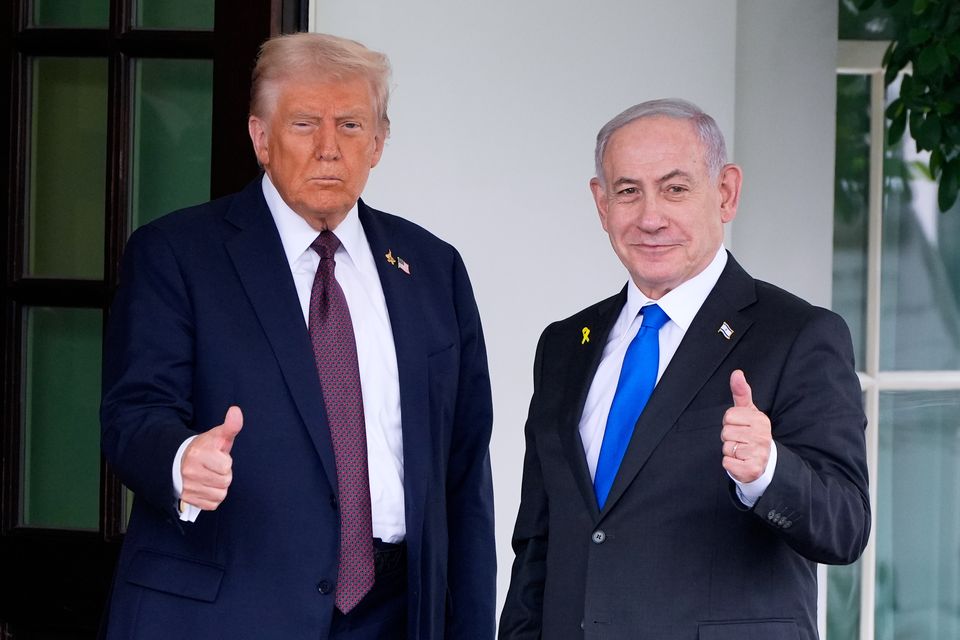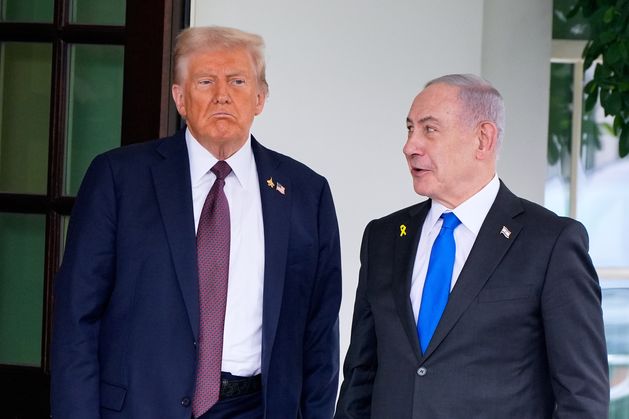If Hamas do not agree, Trump said Israeli prime minister Netanyahu would have his “full backing to do what you would have to do”The US president said that this is “potentially one of the greatest days ever in civilisation”
The US president will oversee the transitional governance of Gaza as the head of a new body called the Board of Peace which Mr Blair will also sit on, the White House announced.
“Gaza will be governed under the temporary transitional governance of a technocratic, apolitical Palestinian committee, responsible for delivering the day-to-day running of public services and municipalities for the people in Gaza,” the plan reads.
“This committee will be made up of qualified Palestinians and international experts, with oversight and supervision by a new international transitional body, the ‘Board of Peace,’ which will be headed and chaired by President Donald J. Trump, with other members and heads of State to be announced, including former prime minister Tony Blair.”
As he met Israeli prime minister Benjamin Netanyahu on Monday, Trump said “We are beyond very close” to a peace deal.
Netanyahu has agreed to Donald Trump’s plan for peace in Gaza, the US president told a press conference on Monday.
He said: “I also want to thank Prime Minister Netanyahu for agreeing to the plan and for trusting that, if we work together, we can bring an end to the death and destruction that we’ve seen for so many years, decades, even centuries, and begin a new chapter of security, peace and prosperity for the entire region.”
If Hamas agree to the plan, there will be an immediate ceasefire, the hostages must be be released within 72 hours, followed by the release of Palestinian prisoners.
If Hamas do not agree, Mr Trump said Mr Netanyahu would have his “full backing to do what you would have to do”.
The US President said that this is “potentially one of the greatest days ever in civilisation”.
The White House released a 20-point plan designed to end the war between Israel and Hamas in Gaza following the meeting.
The plan stipulates that the conflict would end immediately if accepted by both Israel and Hamas, and that all hostages and the remains of those who died would be returned within 72 hours. The agreement would also see Israel release nearly 2,000 prisoners and stipulates that Israel would not occupy or annex Gaza.
The proposal encourages Gaza residents to remain in place, pledges the immediate resumption of aid, and says a “panel of experts” would be convened to “rebuild and energize” the war-torn area with economic development.
The plan calls for Hamas to agree not to have any direct or indirect role in the governance of Gaza, and references a future where the conditions for a Palestinian state “may finally be in place” if the agreement is implemented.
It is unclear if Hamas will also sign on to those terms even as the war nears its two-year mark. The militant group, which sparked the war with an October 7, 2023, attack on Israel, said ahead of the Trump-Netanyahu meeting that it had not yet seen the plan and would need to study the proposal.
Trump shared his plan with leaders from Muslim-majority countries during a meeting in New York last week on the sidelines of the UN General Assembly and had teased the prospect of imminent progress.
“We have a real chance for greatness in the Middle East,” Trump said on social media Sunday, raising hopes for a deal and insisting that “we will get it done.”
Trump and Netanyahu entered Monday’s meeting, their fourth this year, at a crossroads with Israel increasingly isolated on the the international stage and intensifying pressure from the US president for a ceasefire.
The path to the agreement was also eased by a phone call – set up by Trump – earlier on Monday where Netanyahu expressed regret to Qatar’s prime minister for a strike on Doha aimed at killing senior Hamas leaders. Qatar, a key mediator between Israel and Hamas, and the host of the largest US military base in the region was outraged by the strike, as were other Arab states.
Netanyahu expressed regret that the strike accidentally killed a Qatari serviceman on the call, according to a White House readout.
This is a breaking news update. More to follow shortly…
US President Donald Trump is hosting Israeli prime minister Benjamin Netanyahu for critical talks aimed at ending the war in Gaza and developing a US plan on post-war governance in the Palestinian territory.
The White House talks come at a tenuous moment. Israel is increasingly isolated, losing support from many countries that were long its steadfast allies.
At home, Mr Netanyahu’s governing coalition appears more fragile than ever. And the White House is showing signs of impatience.

President Donald Trump greets Israeli Prime Minister Benjamin Netanyahu at the West Wing (Alex Brandon/AP)
The question now is whether Mr Trump, who has offered steadfast backing to Mr Netanyahu throughout the war, will change his tone and turn up the pressure on Israel to wind down the conflict.
As he welcomed Mr Netanyahu to the White House, Mr Trump responded affirmatively when asked by reporters whether he was confident a deal would be soon reached to end the fighting between Israel and Hamas.
“I am. I’m very confident,” Mr Trump said.
Earlier, White House press secretary Karoline Leavitt urged both sides to finalise an agreement to bring an end to the nearly two-year-old war in Gaza.
“Ultimately the president knows when you get to a good deal, both sides are going to leave a little bit unhappy,” Ms Leavitt told reporters. “But we need this conflict to end.”
Mr Trump and Mr Netanyahu are first holding talks with aides in the Oval Office. A joint press conference is expected later.
The uncertainty surrounding the meeting casts it as “one of the most critical” in the years-long relationship between the two leaders, said professor Eytan Gilboa, an expert on US-Israeli relations at Bar-Ilan and Reichman universities.
“Netanyahu might have to choose between Trump and his coalition members,” a number of whom want the war to continue, Mr Gilboa said. A move by Mr Netanyahu to end the war would leave him on shaky political ground at home a year before elections.
Mr Trump joined forces with Mr Netanyahu during Israel’s brief war with Iran in June, ordering US stealth bombers to strike three nuclear sites, and he has supported the Israeli leader during his corruption trial, describing the case as a “witch hunt.”
But the relationship has become more tense lately. Mr Trump was frustrated by Israel’s failed strike this month on Hamas officials in Qatar, a US ally in the region that had been hosting negotiations to end the war in Gaza.
Recent comments have hinted at growing impatience from Washington. Last week, Mr Trump vowed to prevent Israel from annexing the West Bank — an idea promoted by some of Mr Netanyahu’s hard-line governing partners. The international community opposes annexation, saying it would destroy hopes for a two-state solution.
On Friday, Mr Trump raised expectations for the meeting with Mr Netanyahu, telling reporters the US was “very close to a deal on Gaza”.
Mr Trump made finding quick ends to the Gaza war, as well as Russia’s invasion of Ukraine, a central plank of his successful 2024 presidential campaign. He has struggled on both fronts.
Mr Trump’s proposal to stop the war in Gaza calls for an immediate ceasefire, the release of all hostages within 48 hours and a gradual withdrawal of Israeli forces from the Palestinian enclave, according to three Arab officials briefed on the plan.
Hamas is believed to be holding 48 hostages, 20 of whom are believed by Israel to be alive. The militant group has demanded Israel agree to end the war and withdraw from all of Gaza as part of any permanent ceasefire.
Mr Trump discussed the plan with Arab and Islamic leaders in New York on the sidelines of the UN General Assembly. It does not include the expulsion of Palestinians from Gaza, which Mr Trump appeared to endorse earlier this year.
The 21-point proposal also calls for an end to Hamas rule of Gaza and the disarmament of the militant group, said the officials briefed on the plan. Hundreds of Palestinians, including many serving life sentences, will be released by Israel, according to the proposal.
The plan also includes the establishment of an international security force to take over law enforcement in postwar Gaza, they said.
A Palestinian committee of technocrats would oversee the civilian affairs of the strip, with power handed over later to a reformed Palestinian Authority, they said.
Mr Netanyahu has rejected any role for the authority, the internationally recognised representative of the Palestinians, in post-war Gaza.
A Hamas official said the group was briefed on the plan but has yet to receive an official offer from Egyptian and Qatari mediators. The group has repeatedly rejected laying down arms and has linked its weapons to the establishment of an independent Palestinian state.
Mr Netanyahu acknowledged the US plan on Sunday in an interview with Fox News Channel, saying Israeli officials were “working with President Trump’s team … and I hope we can make it a go”.
